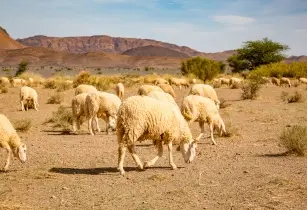At a panel focused on fostering peace in the Sahel region, FAO director-general QU Dongyu said mobile pastoralism is an important platform for livelihoods in the Sahel region and improved governance can help reduce the risk of conflicts.
“Increasing conflicts and insecurity in agro-pastoral areas have led to a negative view of cross-border transhumance, despite its significant economic benefits and socio-cultural and environmental importance,” QU said. “Transhumant pastoralism is a vital strategy, employed by millions of people across the Sahel to convert scarce and variable natural resources into a sustained source of nutritious food, income and viable livelihoods.”
QU spoke at a meeting of the UN Peacebuilding Commission focused on how to support the UN Integrated Strategy for the Sahel (UNISS) countries in the region and efforts by the G5 Sahel – Burkina Faso, Chad, Mali, Mauritania, and Niger – to address climate degradation challenges from a peacebuilding perspective. Participants reviewed a flagship initiative of FAO and the International Organisation of Migration (IOM) on transhumance in the region to identify opportunities and challenges its implementation has brought to light.
The G5 Sahel countries have experienced security threats and driving massive humanitarian needs. FAO’s initiatives in the region are focused on revitalising local mechanisms for preventing and managing conflicts related to access to and use of natural resources, with the goal of reaping local peace dividends. FAO uses conflict analysis to take stock of conflicts over natural resources and other conflicts in rural areas, identify initiatives for conflict prevention and management, and formulate proposals to improve the effectiveness of conflict prevention and management mechanisms. The conflict analysis is one of the main activities implemented in projects such as 'Strengthening the resilience of cross-border pastoral and agropastoral populations in priority areas in the Sahel' funded by the Global Network Against Food Crises and the EU.
With funding from the Peacebuilding Fund, FAO and the IOM have partnered on a project in the Liptako-Gourma area, which borders Burkina Faso, Mali and Niger and is under particular strain from a complex set of factors including dwindling resources, climate variability, demographic pressure, high levels of poverty, disaffection, communal tension and the absence of state institutions and basic services, all exacerbated by violence related to organised crime and non-state armed groups.
Using the Transhumance Tracking Tool developed by IOM and FAO to provide an early response mechanism for local stakeholders to alleviate potential conflicts, the project enables identification of the scale of emerging problems, notably the number of pastoralists who are “stranded”, mostly due to security reasons, COVID-19 restrictions, government rules or the relative presence or absence of viable grazing lands. Stranded herders face particular challenges in gaining access to livestock markets to sell their cattle.




